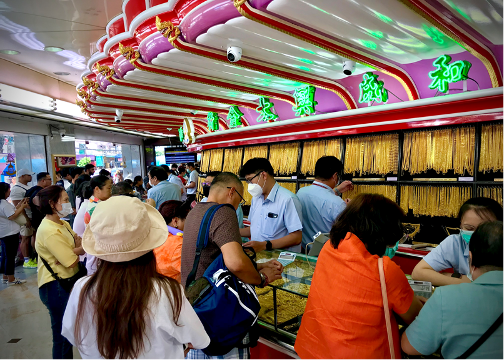Two Cultures Desperate to Protect Their Wealth.
Bangkok, Thailand.
Something’s going on in the gold market…
Now, I do not know that for a fact, and I am not sure what exactly is afoot—though I do have my suspicions.
I’m just basing my off-handed analysis on this photo I snapped—secretly, I might add—at a gold shop here in Bangkok’s Chinatown.

Off to the far left there—that’s a line of people waiting for their turn at grabbing golden earrings, necklaces, bracelets, and other trinkets of the 21- and 22-carat variety.
The line actually stretches out the door, where an attendant keeps an eye on everyone and everything… which is why I had to snap this photo secretly. My first effort at photo-snapping met with defeat when the attendant scolded me.
Now, if this were the only gold merchant in Bangkok’s Chinatown, then you might rightly say, “Well, El Jefe, it’s the only gold merchant in Bangkok’s Chinatown, you Goombah! And the Chinese love their golden wealth, so of course it’s packed.”
Ah, dear reader, tis here I must tell you that I counted 17 gold shops on this street alone before I stopped counting. They’re everywhere. Almost on every street corner, and sandwiched here and there between traditional Chinese medicine shops, shark-fin restaurants, and street vendors dishing up all kinds of bubbling broths and fried this-n-that.
Many of them were equally as packed as this one.
If we were within three months of Chinese New Year, then I would say that’s why all these people are packed into a goldsmith’s shop in Bangkok. That’s China’s primary gold-buying season.
But Chinese New Year is still about half-a-year away. So, the calendar doesn’t help us…
But this might:
China Is Buying Gold Like There’s No Tomorrow
That was a headline atop a New York Times story from May.
Per the Times:
Chinese consumers have flocked to gold as their confidence in traditional investments like real estate or stocks has faltered. At the same time, the country’s central bank has steadily added to its gold reserves, while whittling away at its holdings of US debt. And throwing fuel on the fire are Chinese speculators betting that there is still room for appreciation.
The Chinese are clearly onto something.
They’re racing into gold because gold is the asset of last resort for a world that feels very much like the 1920s before the crash—or what I assume the 1920s probably felt like based on my readings of financial history.
Americans clearly share a similar vibe with their Chinese consumer counterparts.
Another NYT headline, this one from April:
Customers Flock to Costco to Buy Gold Bars
The Times noted in that story that a Wells Fargo analyst calculated that Costo might be selling as much as $200 million worth of one-ounce gold bars every month (emphasis mine).
Costco sells out of new deliveries of the bars so quickly that online forums have popped up with people offering advice on how to snag them when new deliveries arrive.
Two continents. Two cultures. Both eager/desperate to protect their wealth because they know something in the global economy stinks worse than ripe durian fruit befouling the sultry Bangkok air. (And if you’ve never smelled ripe durian on a sultry day in Asia, well, you’re missing out on something truly noxious.)
My wife Yulia popped into several goldsmiths along this particular Bangkok street to poke around. I tried to get her to buy a relatively thick 22-carat necklace fashioned in the style that’s popular in Asia and India—namely a filigreed, matte gold.
Alas, she turned me down.
During our six-week stay in Koh Samui, Thailand—and our stop in Doha, Qatar on the flight to Asia—she snapped up a necklace and matching anklet made from small pearls, as well as a handmade silver bracelet and dangly silver earrings.
“I think I have enough gold,” she told me. “And we need to think about money since we have to rent a new apartment” when we’re back in Lisbon later this month.
For the record, she doesn’t have enough gold. She needs more because it’s more wealth protection for us for the dollar/fiat currency crisis in the offing.
But I didn’t argue because I know she’s worried about finding a nice apartment.
Still, we have three more days in Bangkok before the flight back to Portugal, and I might just wear her down to the point she agrees that she does, in fact, want a gold necklace. (Crazy that I have to convince my wife to buy jewelry!)
The way I see it, these gold buyers in Bangkok are on to something.
They reflexively sense what I sense: That the durian fruit of government money stinks to high heaven, and the only way to mask the funk is to bathe yourself in a large bit of gold.
